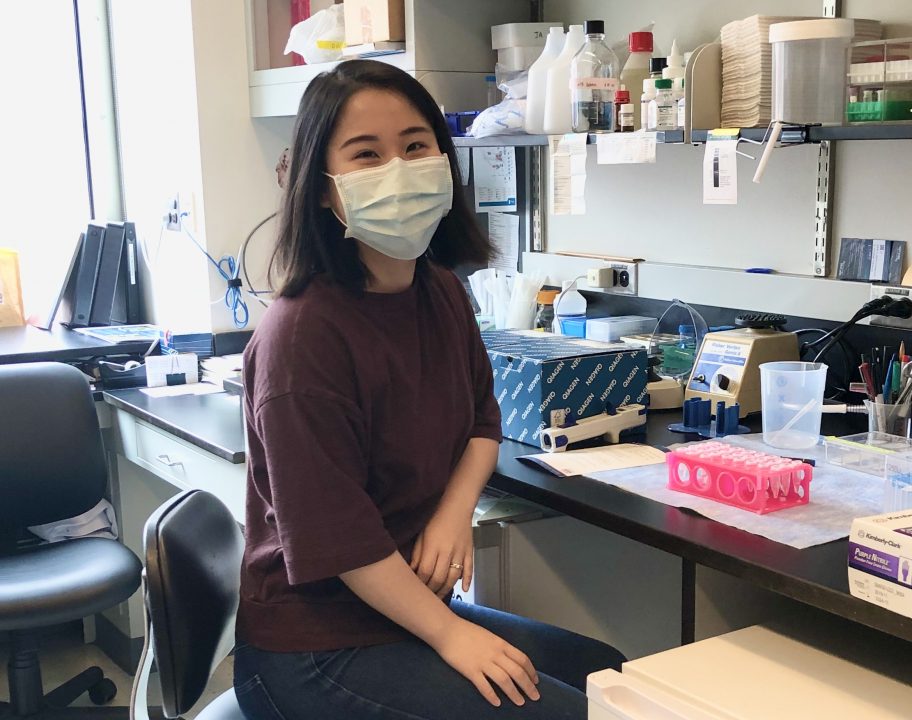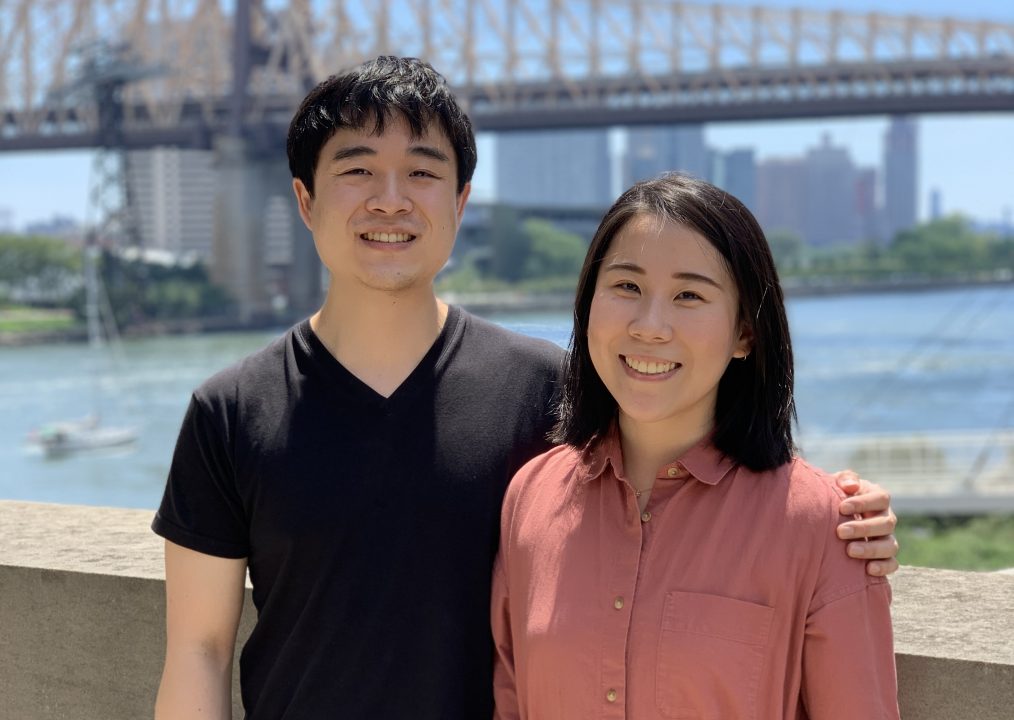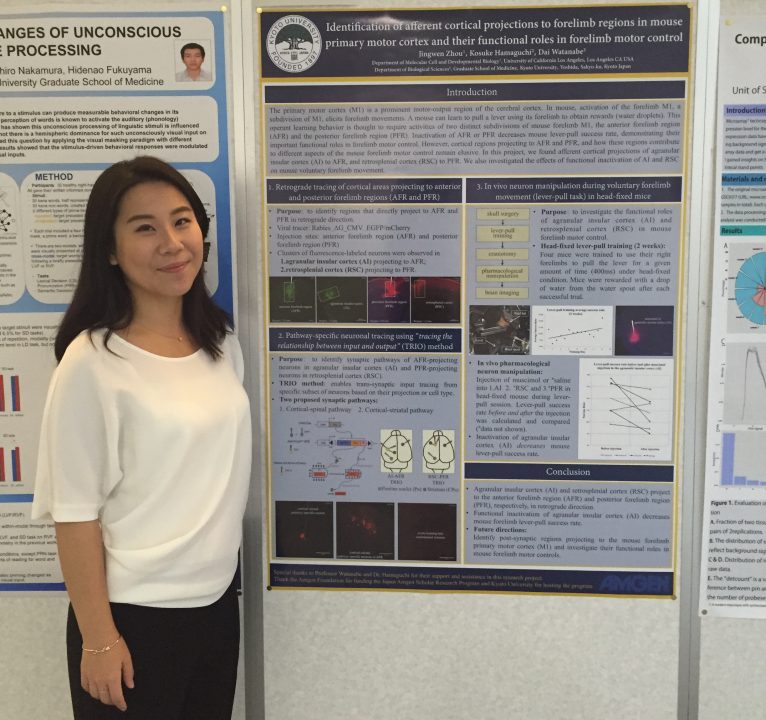Five Years Later: Romance and Research Bud from Amgen Scholars

When Tatsuya Araki recommended the Amgen Scholars Program (ASP) to fellow UCLA student Jingwen Zhou, neither knew how significant that moment would be in their lives. Tatsuya was a 2013 Amgen Scholar at UCLA, and Jingwen would go on to be an Amgen Scholar in 2015 at Kyoto University. In Japan, their paths would cross again, as Tatsuya was visiting his grandparents for the summer. Now married to each other, Jingwen and Tatsuya continue to pursue their scientific careers in New York City.
“In one sense, the Amgen Scholars Program has influenced my life in the most significant way possible – it brought my husband and I together,” says Jingwen (now Araki). It also enabled her to pursue a path in research. Jingwen is now a senior research technician at Memorial Sloan Kettering Cancer Center (MSKCC), also pursuing a master’s degree, while her husband Tatsuya is a Ph.D. student in immunology at the Rockefeller University.
ASP caught up with Jingwen to discuss her scientific path in July, including her early interests in science, working at a research center, and advice to current students.

ASP: First, how are you doing in this pandemic? How has it affected you and your work?
Jingwen: Thankfully I am doing fairly well during the pandemic. Although I was unable to do much research work for several months due to the lockdown in New York City, I was able to utilize the time to focus on my graduate school work, enjoy time with family, and explore some new cooking recipes. My husband and I adopted a puppy right before the pandemic and she did a great job keeping us busy. Since the pandemic has gotten a lot better in the city recently, I have been back to work full time starting from the beginning of July, with proper masking and social distancing. It is definitely great to be able to meet my colleagues in person again and to dive back into science.
ASP: Stepping back, how did you become interested in science?
Jingwen: I think my interest in science started at an early age. During elementary school time, my parents used to get me monthly subscriptions of science magazines for kids and I remember always being super excited reading them. I learned a lot of random but fun knowledge about natural science, geography, biology, and astronomy from those books during early days. Later on, as the school started to teach biology, I naturally fell in love with this subject and I just enjoy learning more fascinating facts about how mother nature works both macro- and microscopically.

ASP: What was your favorite part of the Amgen Scholars Program?
Jingwen: I was an international student at UCLA when I applied to ASP. The dilemma at the time of my application was that my immigration status automatically disqualified me from most U.S. domestic summer undergraduate research programs. I was very thankful for the Amgen Foundation that it decided to expand ASP to international institutions and opened up its door to students from all around the world. I am still very honored to be one of the first cohort of Amgen international alumni.
I did my summer research at Kyoto University, Japan. I mean, who would think it’s not cool to spend an entire summer in one of the most beautiful cities in Japan? Our program director and coordinator at that time were extremely friendly and took good care of us. They developed so many interesting programs for us to balance life between research and exploring the city. I love that they took us out every weekend as a group to visit tourist attractions, attend pottery class, experience tea ceremony and try traditional Japanese tie-dyeing.
One of the highlights from that summer was to attend the Japan Amgen Scholar Symposium in Tokyo together with Amgen Scholars from Tokyo university. I am still friends with many of them today even though we only met for a couple days.
ASP: You are now a senior research technician at MSKCC. What is it like working at a research center?
Jingwen: There is a lot of collaboration going on at MSKCC. We frequently reach out to or are reached out to by scientists from both MSKCC and other research institutes. In a research center like the Sloan Kettering Institute, research is always the center of attention. You do research experiments in the lab, you go to work with collaborators, you attend seminars and talks, and you talk about science with your colleagues during lunch breaks. You get to meet so many great scientists with brilliant ideas and hear about their research stories. It’s definitely an immersive experience for research science!
ASP: What does your current job entail?
Jingwen: I’ve been working in president Craig Thompson’s lab since 2016 after I moved to NYC. The lab focuses on molecular signaling pathways that regulate nutrient uptake and the role these pathways play in the regulation of cell growth and survival. My current position is senior research technician doubled as the lab manager. The majority of the time I work closely with a postdoc in the lab. We design and perform experiments, analyze data, and eventually publish research papers together. We previously published a research paper back in 2017, and we currently have another paper in press that will be published soon. I also manage lab business such as big purchasing, equipment maintenance, inventories, communications with departments within MSKCC or service providers outside of MSKCC, and other miscellaneous tasks that come up on a daily basis.
ASP: What has been the most exciting or surprising thing coming out of your current work?
Jingwen: Honestly one of the most surprising things over the past years working in the Thompson Lab was that I quickly grew into someone who takes on a lot of responsibilities in running the lab and became a person who everyone trusts. I started working in this lab thinking I would just remain as a junior technician working with my assigned postdoc and that’s about it. However, after less than two years of joining the lab, the previous lab manager was leaving for another position, and I was appointed to be the one who took over his position. So all of a sudden my daily work went from caring only about research to overseeing the entire lab. It was a steep learning curve but looking back I am thankful for these opportunities and challenges.
ASP: Did you imagine this is where you’d be 5 years later?
Jingwen: No, I didn’t. My plan was to apply for Ph.D. programs in neuroscience after graduating college, and I was pretty much on track. However, as I was married to my husband right after graduation and given that he was already several years into his Ph.D., it didn’t make sense to us that I would also apply for Ph.D. and potentially be physically separated from him or delay his graduation plan. I quickly settled in my current job and never regretted the decision. During the past few years of researching how nutrients affect tumor growth, along with my undergraduate research experience in junk foods, I’ve become very interested in nutrition, which is why I am now working toward a master’s degree in nutrition.
ASP: What is the driving force behind your work and what are your future goals?
Jingwen: I enjoy helping people and making people’s life easier. I aim to create a comfortable yet organized environment in the lab so everyone can better focus on the science they are doing. With this goal in mind, I always pay attention to details and seek improvements to make things better and people happier.
For my career goal, I plan to move on to the biotech industry after my husband finishes his Ph.D. training. Therefore, I’m very intentional in training myself at work with skills that can make me a competent candidate for my next job. On top of skills in scientific research, skills such as productivity, management, communication, and networking are the ones that I’m focused on developing currently. The Amgen Scholars’ network is a perfect platform for anyone who wants to stay connected and learn more about the company itself or the biotech industry in general.

